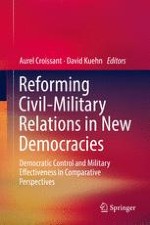2017 | OriginalPaper | Chapter
9. Democratic Control and Military Effectiveness of the Turkish Armed Forces
Author : Tuba Eldem
Published in: Reforming Civil-Military Relations in New Democracies
Publisher: Springer International Publishing
Activate our intelligent search to find suitable subject content or patents.
Select sections of text to find matching patents with Artificial Intelligence. powered by
Select sections of text to find additional relevant content using AI-assisted search. powered by
